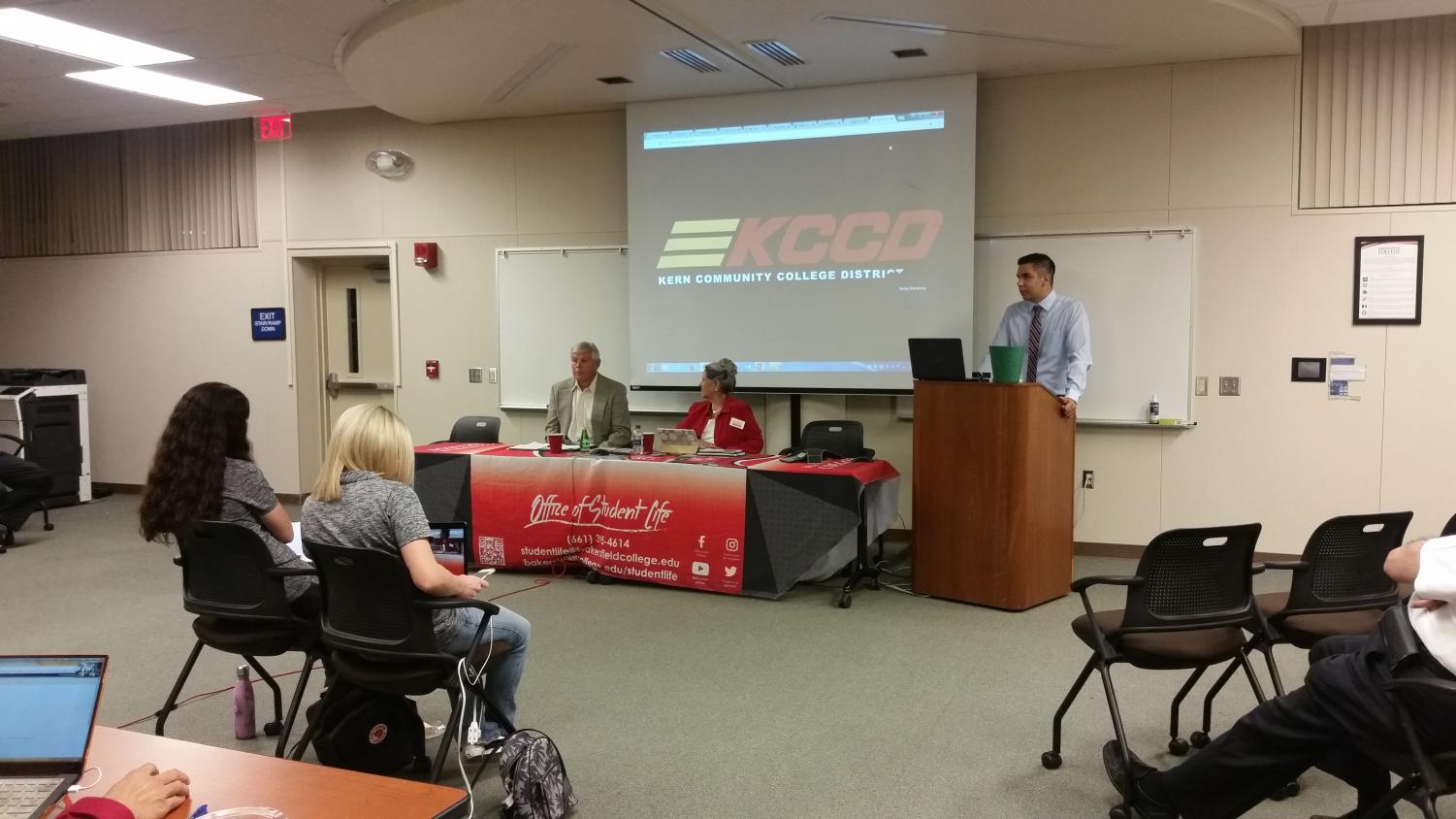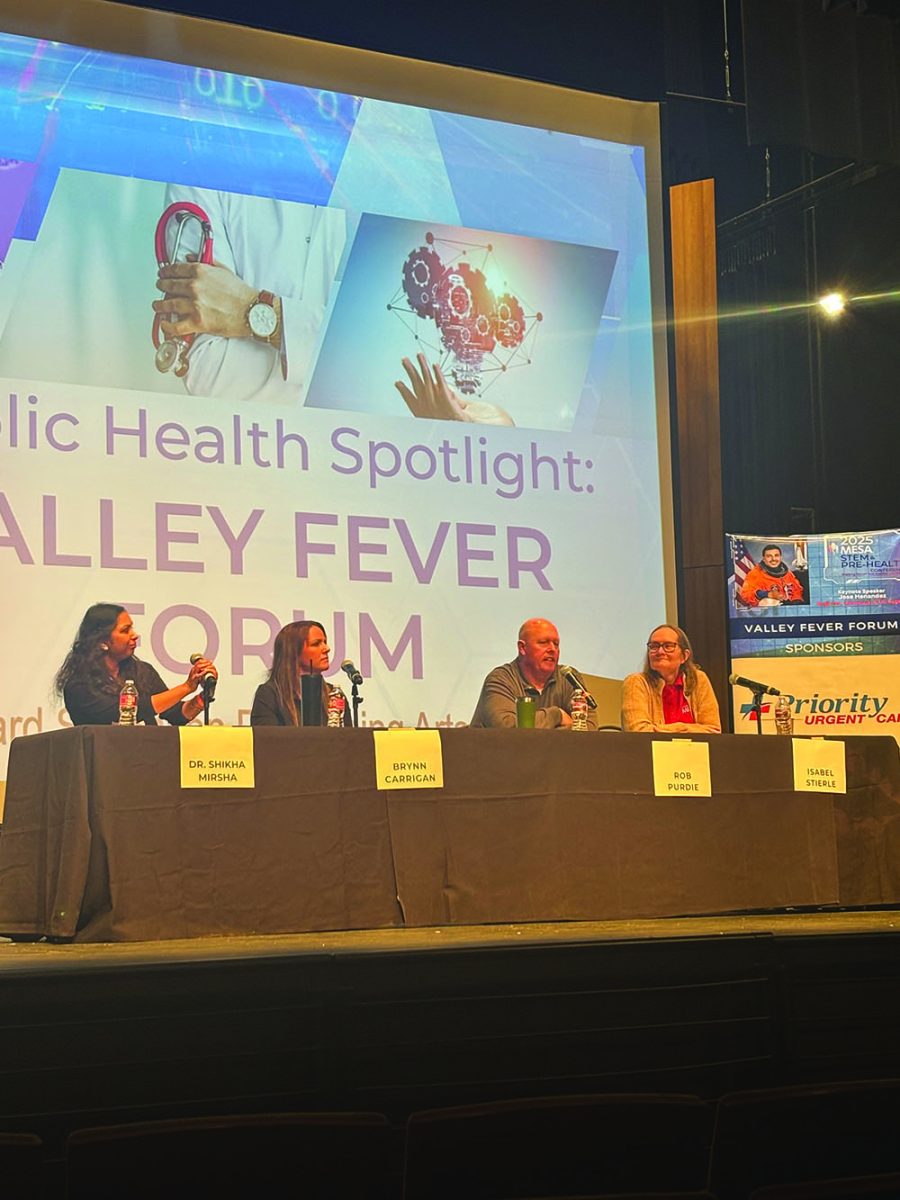KCCD trustee candidates discuss policy ideas at community forum
October 15, 2018

Jerry Melsom (left) and Nan Gomez Heitzeberg (center) discuss their main concerns surrounding their platforms for their campaign for KCCD trustee. Mustafa Barraj (right) moderates the forum.
Providing half a billion dollars for Bakersfield College to improve its campus, Measure J became the focal point of BCSGA’s Oct. 8 Community Public Forum for the Area 1 candidates for the KCCD Board of Trustees.
“When you have all this Measure J money up here, I’m the only one that would be able to understand the bargain you’re going to see on the job,” said candidate Jerry Melsom, a retired electrician who spent 41 years in the field.
The purpose of the forum, held in the Levan Center and moderated by Director of Legislative Affairs Mustafa Barraj, was to let the BC community meet the candidates for the two open seats and understand their reasons for running.
Though all five candidates were invited, only Melsom and Nan Gomez Heitzeberg attended.
Kyle Carter, the incumbent, was unable to show but sent a statement explaining his qualifications to be elected for a second term.
“I spent the last 43 years of my life in the field of construction,” he wrote. “Currently, I am the only trustee that has construction experience, and I am very committed to make sure that the students at Bakersfield College and the taxpayers in our community get every bit of their money’s worth.”
Being a prominent highlight of the year for BC legislation, Measure J has been the common denominator in most issues and ideas brought up by the candidates for the Nov. 6th election. Approving BC for $415 million, the Measure J bond will make BC construction and remodeling feasible for the next several years. Both Melsom and Gomez Heitzeberg addressed how they each would utilize the bill and fill its independent oversight committee.
“Unlike Mr. Carter … I actually have hands-on experience,” Melsom said. “I know how to deal with projects, and I know what it takes to get them done.”
Currently a faculty member at BC, Melsom believes diversity is key when it comes to the members of the committee.
“You’re not going to get all of the qualifications that [you] would look for in any one person,” he said. “You’re going to need a variety of people and what you don’t want is everybody the same, because then you’re going to only have one opinion, one idea, and [you] want multiple ideas on a committee.”
Gomez Heitzeberg’s concern is whether a member has the appropriate skill set.
“I would be looking for someone who is invested in the community and someone who has expertise,” she said. “Do we have somebody who has expertise in the sciences? … Do we have people who are well-versed in finances and construction?”
Along with having firm grips on how to spend Measure J construction money, both Melsom and Gomez Heitzeberg want to see a shift in the way students enter and leave BC.
Gomez Heitzeberg’s platform centers around getting students “in here and out of here in the shortest time possible.”
With over 40 years of experience in education, BC’s former Vice President said that she has “worked along the faculty to help develop the programs and services to do that.”
Melsom touched on this problem with his own experiences as a student.
“When I went here, just about 80 percent of the students were here to transfer to a four-year [university],” Melsom said. “Later on, it became more of a place for people to get their degree and then not be able to transfer or [they just] didn’t want to.”
Both issues Melsom and Gomez Heitzeberg drive forward could be fixed with AB 705, a bill enacted to allow for students’ college course levels to be determined not only by the assessment test but also on their own individual high school GPAs and courses.
“I wish [AB 705] would’ve been enacted when I was a student,” Melsom said. “It’s a way to show that you are progressing forward and you’re not just looking at a test score, but you’re looking at an evaluation based on [student’s] grades, and … high school coursework … It fast-tracks people to get where they want to go, whether it be a certificate, a transfer, or a degree.”





